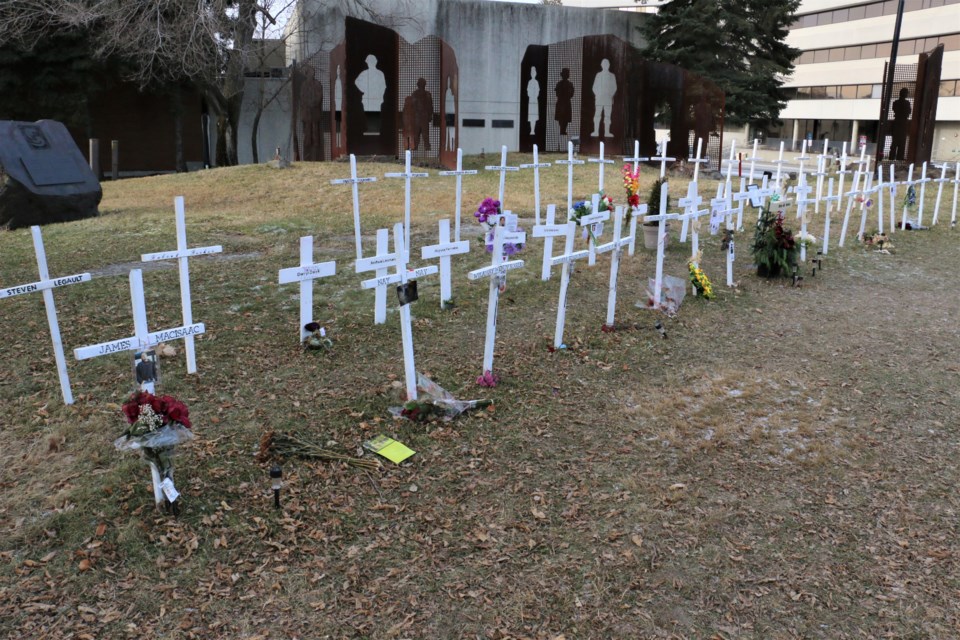Organizers of the white cross memorial installed to raise awareness of the opioid problem in Sudbury are hoping the province will provide some emergency funding for addiction treatment and services.
Denise Sandul said the situation in Sudbury is at a crisis level, and funding for more mental health and addiction services is needed now.
Sandul, the mother of 22-year-old Myles Keaney, began the local memorial movement as a private gesture after her son's body was found downtown on September 8. It is suspected the young man died of an opioid overdose.
Sandul said she doesn't want Keaney's death to be forgotten, or his passing to become just another grim statistic.
She placed a cross in the ground back in September. It didn't go unnoticed. Soon, family members of other opioid victims came forward asking if they too could have a cross there, on a small patch of grass near the fire hall parking lot by the intersection of Shaughnessy and Van Horne streets.
Sandul said the families that came forward do not include the 14 other Sudbury families who have lost loved ones to opioid related causes since September 8.
"The response was much more than I expected," said Sandaul. "And these are all people from Sudbury."
Sandul said it was bittersweet to see so many crosses surrounding the one she set up for her son.
"I am so grateful to those of you who have agreed to mark your loved one's life and their passing in this way, but heartbroken at the fact that such a monument event exists," Sandul wrote in a message on Facebook.
After consultation with city officials, the ad hoc memorial was moved from Van Horne and Shaughnessy over to a larger piece of city land at the corner of Paris and Brady streets in front of the Sudbury Theatre Centre. Sandul said she was grateful for the city's co-operation and is hoping it can become a permanent memorial.
Sandul was out there Tuesday, joined by friends and supporters to install more crosses. There are nearly 80 crosses now. Soon, said Sandul, she expects there will be 100 crosses.
"Certainly the numbers are scary. We have a huge problem. People need to get on board and help fight for change," she said.
Sandul said she knew her son was in trouble before he died. He had tried to get help.
"There was no place for my son to get services he needed,” she said. “He was declined because his situation was seen as too complex in that he was schizophrenic and had an addiction.”
But since his death Sandul said she has become far more vocal.
"I will talk to anyone who will listen." she said.
"This issue is all across Canada. I can only focus on our community. We can't always rely on the government to initiate something.”
Sandul said she raised her concerns with Sudbury MPP Jamie West, who rose in the Ontario Legislature last week to express his alarm.
"The opioid death rate in northern Ontario is almost twice that of southern Ontario. Sudburians are suffering, family members are in mourning and local resources are overwhelmed. My question is, will the Premier commit to immediately increasing funding to help Sudburians like Denise Sandul and her family?" said West.
Health Minister Christine Elliott responded to the question, first to offer condolences to the family of Myles Keaney and anyone else who has lost a loved one to the opioid crisis.
Elliott said Ontario was working on a province-wide solution, and that it would take significant time and money. She said the effort was moving forward through Ontario's Roadmap to Wellness program.
Sandul said she is hoping to generate more support to not only to raise awareness but also to raise the sense of urgency needed. She said it would help to have the support of the city, not only for the memorial, but also in calling on higher levels of government for better treatment and access to addiction services.
"Nobody is untouched by this,” said Sandul. “Pretty much anyone you talk to, anywhere, they know of someone, a friend or a family member. People have addictions and it is not easy on any family."
Sandul said not enough people are comfortable in revealing there are problems in their families.
"There is a stigma. Not everyone wants to talk about it. If they stop talking, more people will die."
